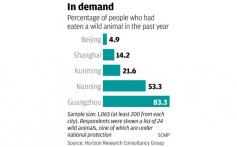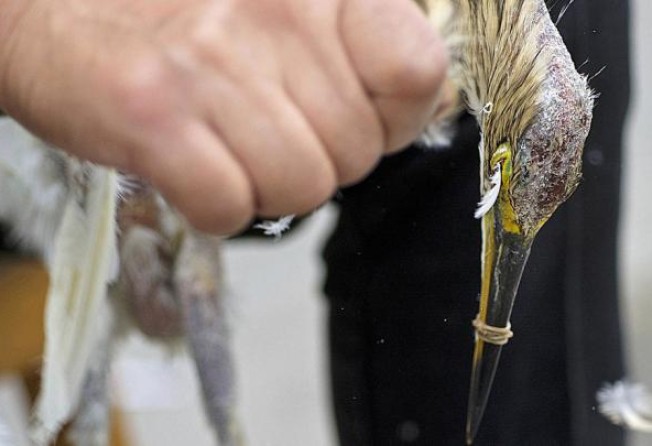
Poaching and trading of wildlife rampant in mainland China
Poaching and trading of species - many nationally protected - is rampant on the mainland, especially in Guangdong where the illegal trade is huge

Early every morning, thousands of wild animals - birds, mammals and reptiles - are sold at the Xingfu market in Conghua, about 60 kilometres northeast of Guangzhou.
It's a trade that has been going on for years.
There are about 300 stalls in what could be the mainland's biggest wildlife market, trading in dozens of species - live and dead - including wild boar, pangolin, civet cat, wild goose, swan, crocodile, snake and rat, to name just a few. Many are nationally protected species.
One stall owner told CCTV last week that between 1,500 and 2,500kg of wild animals were sold each day. The animals, poached mainly in Jiangxi, Guangxi, Fujian province, Hunan and Hubei, are shipped to Guangdong by truck.
After changing hands at least three times, they usually end up on the tables of restaurants and holiday resorts, cooked and consumed by gluttonous guests. Their prices rise exponentially along the way, the trader said.
Demand was so high that buyers who failed to place advance orders missed out, CCTV reported. Following the CCTV report - part of an investigative series on the poaching and consumption of wildlife - the provincial forestry authorities ordered the Xingfu market to "suspend business for rectification", the Guangzhou Daily reported last week.
Poaching, transporting and trading in wildlife is illegal on the mainland and those who sell rare and endangered species could face criminal charges.
Guangdong's forestry department said it had confiscated 66,500 wild animals - 52,600 of them birds - in markets and restaurants since October 8 and seized 9,497 bird nets. It has also set up investigations into 121 cases, with 33 people detained for suspected criminal offences.
However, anyone who expects the market to be closed down for good might be disappointed, animal protection activists have warned. The Xingfu market has survived many such crackdowns over the years, because the poaching and illegal trading of wildlife is just too profitable to be banned effectively.
Zhang Li, director of Conservation International's China programme, said it was alarming that eating wildlife was gaining in popularity, less than 10 years after the outbreak of Sars (severe acute respiratory syndrome) on the mainland, which was linked to the eating of civet cats.
A recent survey by the Beijing-based Horizon Research Consultancy Group showed that 26.9 per cent of residents in five mainland cities - Beijing, Shanghai, Kunming, Nanning and Guangzhou - had eaten wildlife in the previous year.
In Guangzhou, the ratio was a staggering 83.3 per cent. Earlier media reports estimated that millions of wild animals are consumed in Guangzhou every year.
"The figures are going back to pre-Sars levels, and with people more well-off, the revival of the culture of eating wildlife is alarming and dangerous," Zhang said.
Rising demand has spurred illegal poaching and trading of wild animals, making Guangdong a centre for the illegal trade, despite repeated media exposés.
Huang Shandai, 38, a Guangzhou-based animal protection activist, said reports in Guangdong newspapers prompted a similar suspension order for the Xingfu market in August, but soon after it was business as usual.
She described the Xingfu market as "a living hell", adding that the bloody scene and strong stench were among her worst memories in years of saving wildlife.
Some of the dead animals were skinned in the market. Those alive - some with wounds - were squeezed into small cages.
"I can still remember the eyes of a wild goat lying quietly in a cage," Huang said. "And you know when a living animal is traded, at least several others - or dozens in the case of wild birds - have been killed in the process of poaching and transportation."
Forestry police confiscated some of the wild animals, she said, but refused to say how they dealt with them, prompting concerns that the animals might eventually be returned to dealers.
She said some attempts to expose the illegal sale of wildlife were ignored by the authorities, and that supervisory bodies would sometimes even provide cover for the dealers, claiming that the animals on sale were raised in captivity.
Two billboards near the market's entrance warn that anyone trading in wild animals will be fined.
One lists the fines for selling 10 species of mammals - including leopard cat, Reeve's muntjac and the Chinese bamboo rat - with the fines ranging from 400 yuan (HK$500) to 100,000 yuan. The other billboard shows pictures of 30 species of protected animals.
"Most of the animals on the two lists can be found in the Xingfu market," Huang said. "Obviously the dealers have no fear after paying a monthly rent of 6,000 yuan for a stall."
In the CCTV report, a dealer admitted he was tipped off by market authorities before any inspection. "It's because the market pays an annual fee … to the supervisory bodies every year," the dealer said. "They are all linked."
It is also no secret that government officials are - as a group - major consumers of wildlife. In Jiangxi province, rhesus monkeys were served at several restaurants, including one that hosted government banquets, another CCTV report said.
A worker from a Guangzhou-based shipping company said his company often treated clients from other companies and government officials at "wild taste" restaurants, where all kinds of birds, snakes and mammals were served "to show our sincerity and respect".
Such banquets, for fewer than 10 people, usually cost at least several thousand yuan.
Wang Yukai, a professor from the National Academy of Governance, said the rampant poaching of wildlife was a result of negligence by supervisory authorities such as forestry and agricultural departments.
"Officials who eat wild animals are setting a very bad example, especially in the case of animals under national protection. [The officials] are deliberately breaking the law," he said.
The Horizon study found that well-educated men with high incomes were major consumers of wildlife.
Although restaurants serving wild animals are nominally banned in Guangzhou, plenty can be found in the city's suburbs. Searching for "wild taste" in Guangzhou on Dianping.com, a daily deals and local reviews site similar to Yelp, returns dozens of results, with thousands of comments by avid eaters.
In other parts of Guangdong, including Qingyuan, Zhaoqing and Conghua, such restaurants are even more popular, with some famous for offering a "banquet of 100 birds".
He Jianguo from the International Fund for Animal Welfare, said a long-held local belief that eating wildlife is good for you had led to the exploitation of wild animals for their economic value - something still enshrined in the mainland's wildlife protection laws.
"That sends out a fundamentally wrong signal, and makes wildlife protection even more difficult," he said.